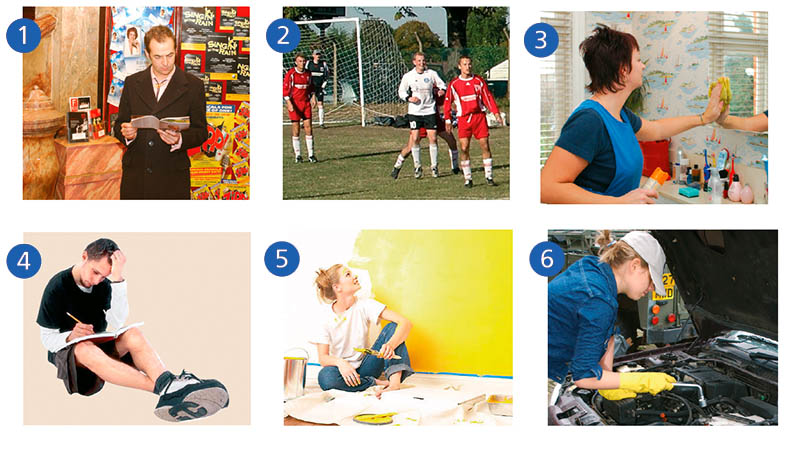Nesta aula do nosso curso online de inglês, você aprenderá como falar sobre atividades. Além disso, esta lição abordará o uso do past simple e mais.
1 . Ouça a gravação. Seis pessoas estão conversando sobre o que fizeram no fim de semana. Associe cada pessoa à foto que mostra o que elas fizeram.
Brian | Clare | Joanne | Sam | Liz | Boris

Do you know?
Fix e mend possuem significados muito parecidos, mas em geral usamos fix para nos referir a máquinas (ex.: carros, máquinas de lavar), e mend para outras coisas (ex.: parte da casa, estradas etc.).
She fixed her car.
We need to mend the garden wall.
Repair pode ser usado para tudo que estiver quebrado.
She repaired her car.
We need to repair the garden wall.
2 . Complete as frases sobre as pessoas do exercício 1 com um verbo do quadro A e uma expressão do quadro B.
Quadro A
decorated | fixed | watched | studied | cleaned | played
Quadro B
computer exam | her car | football | the bedroom | the house | a play
1 Brian ……………………………………………
2 Sam ……………………………………………
3 Joanne …………………………………………
4 Boris ……………………………………………
5 Clare ……………………………………………
6 Liz ………………………………………………
Grammar: Past Simple Tense
Usa-se o past simple
para expressar ações iniciadas no passado e que já foram concluídas.
Este tempo verbal com frequência é empregado em histórias ou em relatos
de fatos ocorridos no passado, como fatos históricos, por exemplo.
We walked home from the cinema last night.
World War I ended in 1918.
1 Verbos regulares
Com verbos regulares, forma-se o past simple com a forma infinitiva do verbo + -ed.
open → opened
cook → cooked
help → helped
work → worked
Aos verbos regulares terminados em -e, acrescenta-se apenas -d.
hope → hoped
move → moved
Com verbos regulares terminados em -y, tira-se o y e acrescenta-se -ied.
hurry → hurried
marry → married
carry → carried
She opened the door and rushed outside.
I hurried down the road before the shops closed.
We carried our suitcases onto the bus.
Nota: Diferente do present simple, no past simple a forma verbal não muda nas pessoas he / she / it.
2 Verbos irregulares
O
passado de muitos verbos comuns em inglês não termina com a forma -ed.
São os verbos irregulares. Eis uma lista de alguns dos verbos
irregulares mais comuns:
be → was / were meet → met
break → broke put → put
buy → bought see → saw
come → came sit → sat
do → did speak → spoke
find → found take → took
go → went think → thought
have → had win → won
make → made
Diferentemente de outros verbos, as pessoas variam de forma no passado simples do verbo to be.
I was We were
You were You were
He / she / it was They were
Present simple
I am hungry.
Let’s have lunch.
I see my girlfriend every day.
She goes to work on the bus.
I do my yoga exercises every day.
They speak on the phone every week.
Past simple
I was hungry.
We had lunch.
I saw her yesterday.
She went to work by car yesterday.
I did my yoga exercises before breakfast.
They spoke to each other last week.
Existem
muitos verbos irregulares em inglês. Tente aprender o maior número
possível. Um bom dicionário de inglês trará uma lista de verbos
irregulares, e no fim deste livro você também encontrará uma lista
dessas. Alguns verbos têm tanto a forma regular quanto a irregular do
past simple. Você pode optar por uma das formas.
burn → burned/burnt
learn → learned/ learnt
dream → dreamed/dreamt
smell → smelled/smelt
I burnt / burned all the rubbish.
3 . Associe os verbos no passado às suas formas no infinitivo.
Simple Past
1 broke
2 won
3 thought
4 put
5 was
6 took
7 did
8 had
Infinitive
a) put
b) have
c) be
d) take
e) break
f) win
g) think
h) do
20 minutes+
Escreva algumas frases sobre você mesmo. Use as formas corretas dos verbos do quadro e dê a cada frase um final apropriado.
watch | use | play | go | be | have | see | do | make | study | travel | buy
1 On Saturday ………………………………………………………………………
2 On Sunday I ……………………………………………………………………
3 On my birthday I …………………………………………………………………
4 During my last holiday I …………………………………………………………
5 Last year I …………………………………………………………………………
Word Bank
decorate (verbo) = decorar, enfeitar
mend (verbo) = consertar, emendar
play (substantivo) = peça teatral
repair (verbo) = consertar
study (verbo) = estudar
Respostas:
Exercício 1
1 Brian
2 Sam
3 Joanne
4 Boris
5 Clare
6 Liz
Exercício 2
1 Brian watched a play.
2 Sam played football.
3 Joanne cleaned the house.
4 Boris studied for his computer exam.
5 Clare decorated the bedroom.
6 Liz repaired her car.
Exercício 3
1-e; 2-f; 3-g; 4-a; 5-c; 6-d; 7-h; 8-b
20 minutes+
Model answers:
1 On Saturday I played football and went to the cinema.
2 On Sunday I had lunch with my mother.
3 On my birthday I saw a new play and had dinner with friends.
4 During my last holiday I was always on the beach.
5 Last year I travelled to China.
 Sair da aula
Sair da aula